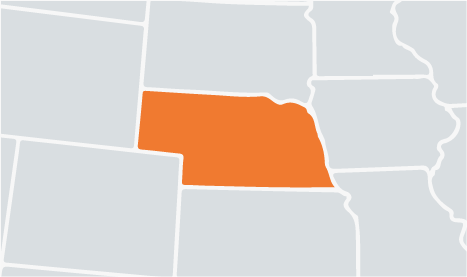| Subgrades | |
| Covered Speech: | F |
| Anti-SLAPP Procedures: | D- |
| Subscores | |
| Covered Speech: | 3 out of 100 points |
| Anti-SLAPP Procedures: | 27 out of 100 points |
| Detailed Scoring on Anti-SLAPP Procedures | |
| Suspension of Court Proceedings Upon an Anti-SLAPP Motion: | 5 of 20 points |
| Burden of Proof on Plaintiff to Defeat an Anti-SLAPP Motion: | 12 of 12 points |
| Right to an Immediate Appeal: | 0 of 25 points |
| Award of Costs and Attorney Fees: | 10 of 40 points |
| Expansive Statutory Interpretation Instruction to Courts: | 0 of 3 points |
State Anti-SLAPP Statute
Nebraska’s anti-SLAPP statute[1] is relatively narrow in scope: it may only be used by a “public applicant or permittee” (that is, someone who has applied for or received a zoning change, license, or other government entitlement) or someone who is materially connected to the entitlement. The statute does not provide for the stay of discovery in the event of an anti-SLAPP filing, although the court must expedite or grant preference in the hearing of the relevant motion. To prevail against an anti-SLAPP motion, the respondent must show that the action has a substantial basis in law or is supported by a substantial argument for an extension, modification, or reversal of existing law. The statute contains no provision for interlocutory appeal of an order on an anti-SLAPP motion. A court may award costs and attorney fees to the prevailing movant on an anti-SLAPP motion if the movant demonstrates that the action was commenced or continued without a substantial basis in fact and law and could not be supported by a substantial argument for the extension, modification, or reversal of existing law. A court may award costs and attorney fees to the respondent only if it is established by clear and convincing evidence that any communication that is material to the cause of action and which gave rise to it was made with knowledge of its falsity or with reckless disregard of whether it was false.
How to Improve Nebraska’s Score
The most important part of anti-SLAPP law is the scope of speech that the statute covers. After all, strong statutory procedural protections are of no help to a speaker if the scope of the statute excludes the speech at issue.
The fundamental flaw in Nebraska’s anti-SLAPP statute is it covers too little speech. If Nebraska simply expanded the scope of its statute to cover the same kinds of speech recommended by the Uniform Law Commission’s model Act, the overall grade would rise to B-.
The Uniform Law Commission’s model law protects any speech about a matter of public importance in any forum. The model is explained in the full report and is available here.
Nebraska should also consider including a right to an “interlocutory” appeal as part of its law. Speaking generally, that is a request to a higher court for it to decide a particular issue immediately. In most litigation, interlocutory appeals are difficult to obtain, so this right of appeal is an important feature of an anti-SLAPP law. Without it, a defendant who loses an anti-SLAPP motion would be forced to continue to litigate the entire trial before the finding on the motion could ever be appealed.
As attorney Ken White has eloquently explained, the provision of a right of interlocutory appeal creates a strong protection for First Amendment liberties, because it “dramatically reduces the coercive effect of filing a lawsuit targeting speech.”
Strong anti-SLAPP laws impose notable costs on plaintiffs with weak or frivolous cases. One important feature of strong anti-SLAPP statutes is that they make losing plaintiffs liable for reasonable attorney fees and court costs originally borne by the speaker.
Unfortunately, Nebraska gives the court the option, not the requirement, of awarding reasonable attorney fees and court costs to prevailing defendants.
A mandatory fee-shifting provision would make it more likely that a defendant with limited financial resources who faces a SLAPP will be represented by an attorney. The prospect of fee-shifting encourages attorneys to provide such defendants with representation – especially when defendants face weak or frivolous claims.
The best anti-SLAPP laws enable defendants to recoup the money they spent on legal costs. Requiring payment of reasonable attorney fees and court costs to prevailing speakers would provide deterrent effects against strategic lawsuits of dubious merit.
The Uniform Law Commission’s model law and several state statutes also suspend all court proceedings when an anti-SLAPP motion is filed; the statutes of most states with anti-SLAPP statutes suspend discovery once an anti-SLAPP motion is filed.
Unfortunately, Nebraska’s law does not automatically suspend proceedings or discovery upon the filing of an anti-SLAPP motion. This failure drives up the cost of litigation to defend against a SLAPP. The state can improve its protections for free speech by adding this provision to the law.












